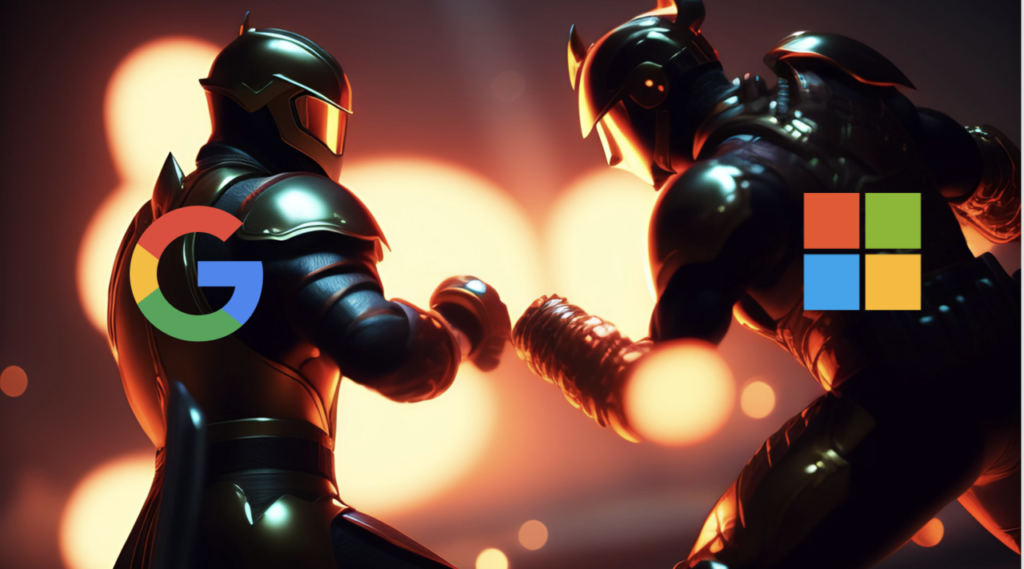
Bing’s Battle for Market Share still Uphill Climb Against Google
The dust has settled six months on since the debut of the AI-powered New Bing — yet the search engine landscape remains strikingly untransformed, both within the domestic US market and globally. Direct visits to the ChatGPT site also show signs of slowdown. A brief look at the major stat counters shows Bing’s share of the search market stuck in a curious state of inertia. Prior to the launch of Microsoft AI-driven browser in January, Bing’s market share stood at a meagre 3%. Fast forward to late summer 2023 and the figures seem to have remained virtually unchanged.
Bing’s U.S. search market share was 6.47% in July, per web analytics service StatCounter. Meanwhile, Google’s desktop search market share remains close to 90%. Bing’s share amounts to just a fraction of Google’s.
At launch, Microsoft’s New Bing promised to erode much of Google’s share of the pie. It is surprising that this has not happened — and difficult to put a single finger on exactly why.
Microsoft has contested the third-party data, according to an article published by the Wall Street Journal today, stating that “third-party data companies aren’t measuring all the people who are going directly to Bing’s chat page.” Microsoft’s chief marketing officer for consumer products, Yusuf Mehdi, stated Microsoft’s own data shows Bing gaining market share — presumably taking a broader view: “We’ve made more progress in the last six months than we have in the previous decade or two combined,” Mehdi said. “We’re delighted with our start.” Google’s position as the longstanding frontrunner in the internet search has shown remarkable resilience. Over the years, users have become accustomed to Google’s ultra-simple design. Shifting to a new AI-infused search engine demands an adjustment that many of us are reluctant to take.
Businesses and SEOs have grown accustomed to Google’s search algorithms, which have undergone years of refinement to deliver accurate and relevant information. The New Bing’s reliance on AI-driven search results, while innovative, may not yet have garnered the trust required to sway users away from Google’s proven track record.
Bing’s introduction of AI-powered search has promised an innovative approach to information retrieval, but AI’s potential to make mistakes sees most users stick with the tries and teste. The fear of encountering incorrect or misleading information from AI bots (sometimes referred to as “hallucinations”) has left many cautious about fully embracing this new technology, particularly in the case of academics and business leaders.
ChatGPT has itself has made a more impressive impact. The site acquired 1 million users just 5 days after launching in November 2022 and currently receives in excess of 100 million regular users, according to Exploding Topics. The site generated 1.6 billion visits across June 2023. Around 9 out of 10 of those visits have been direct.
OpenAI has projected revenues of $200 million for 2023 and $1 billion by 2024 compared to figures under $10 million back in 2022. In short, users have shown a preference for visiting ChatGPT directly, rather than through Bing — even while those figures seem to be levelling-off. Worldwide desktop and mobile web traffic decreased downwards by 10% or so from May to June. Visitor engagement has also decreased somewhat.
Alphabet’s own Google Bard has struggled more than its rival to gain traction. A notorious mistake made by the chatbot during its demo launch resulted in a $100 billion hole in Alphabet’s valuation. Meanwhile, Google’s UK boss has gone as far to admit users should not trust Bard for accurate information.
Nevertheless, with ad revenue exceeding $220 billion, Alphabet remains comfortably positioned with its robust traditional search business.
There are few pockets around the globe where Google Search is not the go-to choice. In China, the government’s strict control over internet content has led to the rise of local search engines like Baidu. Russia tends towards Yandex. Itself censored, Yandex is also more capable when it comes to the Cyrillic script.
The only partial exceptions in the democratic world would seem to be Yahoo! Japan and the South Korean site, Naver, with Google taking “only” 72% and 61% of the pie in those nations.
Google’s extensive market share in search and online advertising has led to debates over monopoly concerns. While fines and antitrust cases have been imposed by the EU and US alike, the complex nature of Google’s integration and its pivotal role on the net make the prospect of a complete breakup unlikely.
It may be the case that conventional search engines remain a comforting choice for those who prioritise accuracy and consistency in their online searches. As AI continues to evolve, striking a balance between cutting-edge technology and trustworthy results will be key to winning over sceptics.
There is no denying Microsoft made waves this year with the New Bing. Google Search remains a formidable force, but ChatGPT might yet crack more of the ads market, particularly as voice control features become integrated with further devices.